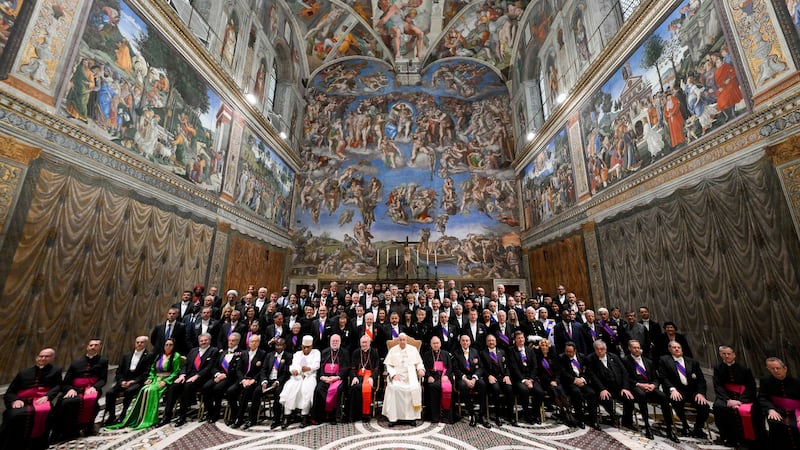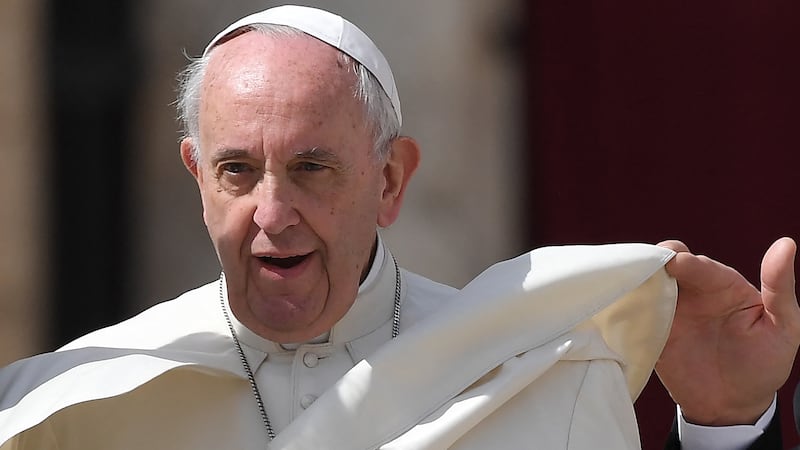Ceremonial white smoke billowed from the chimney of the Sistine Chapel when Argentinian Archbishop Jorge Mario Bergoglio—Pope Francis I—was elected to the papacy on March 13, 2013, at the age of 76.
After his death on Monday, aged 88, the process to pick a successor will begin anew.
As the city of Rome begins preparing for an influx of mourners, voting for the new pope won’t start for at least another 15 days. Until then, predictions about papal succession are notoriously unreliable.
What happens when the Pope dies?
When the pope dies, the Roman Catholic Church enters a period of mourning called the “interregnum.” His death is verified by the cardinal who manages the papal finances and property, and burial plans are set in motion.
The papal ring is symbolically destroyed with a ceremonial hammer upon his death (or abdication) to signify the end of his reign.

According to the Universi Dominici Gregis constitution, which governs the papal transition, the pope’s burial must take place between four to six days after his death. Then a conclave of the 135 voting cardinals—110 of whom were appointed by Francis—assemble at the Vatican to vote, between 15 and 20 days after the pope’s death, to begin the process that will determine his successor.
There are 252 cardinals in the Sacred College of Cardinals, but only cardinals under the age of 80 are eligible to vote.
Finding the Perfect Pope
Once a conclave begins, cardinals—like jurors—sequester themselves away from the news and the influence of the outside world in the Sistine Chapel.
They remain there, voting in secret, until a candidate receives a two-thirds majority. Candidates are assessed amid a mixture of speeches, prayer, reflection and, of course, politics. Although there is an age cap on the cardinals who can participate in a conclave, there is no age limit on a would-be pope.
Conclave members cannot vote for themselves. However, members will usually throw their weight behind a candidate who most closely aligns with their views.
In fact, any baptized Roman Catholic male could technically become pope. The last non-cardinal to do so was in 1378, which led to the Great Western Schism, when several different people claimed to be pope.
The process was dramatized in the Oscar-nominated film 2024 film Conclave, starring Ralph Fiennes as a cardinal tasked with uncovering the dark secrets of several leading candidates.
Those thought to be in the running for the job after Francis include: Cardinal Pietro Parolin, the Vatican’s secretary of state; Cardinal Luis Tagle, prefect of the Congregation for the Evangelization of Peoples; and Cardinal Peter Turkson, chancellor of the Vatican’s scientific academy, who would become the first Black pope, per Edward Pentin’s The Next Pope: The Leading Cardinal Candidates, reported The Independent.
Each day the conclave fails to elect a new pope, the voting ballots are burned with a chemical to create black smoke that rises from the chimney of the Sistine Chapel. The conclave votes several times a day.
When the cardinals do finally decide on a new pope, the senior cardinal deacon introduces His Holiness on the balcony overlooking St. Peter’s Square in Vatican City with the declaration: “Habemus Papam!” (Latin for “We have a pope!”)
Behind the scenes, the new pope chooses his name after being asked in Latin, “By what name shall you be called?”
He is taken to a “room of weeping,” Airmail reported, where he is afforded time to “reflect on the weight he now carries on his shoulders.” It’s here he is dressed in his papal robes from a selection provided; a tailor is sent to see the new pope a few days after his successful election to be properly fitted for a cassock and ceremonial investments.
Pope Francis I, who succeeded Pope Benedict XVI following the latter’s resignation over health concerns, chose the name Francis in honor of Saint Francis of Assisi, a 13th-century Italian saint and founder of the Franciscan order. Francis often spoke highly of Benedict, who died in 2022.

Francis was the first non-European pope and the first Jesuit to lead the Catholic Church; his at-times progressive views ruffled feathers over the years among the church’s more conservative cardinals and believers.
He criticized capitalism, supported compassion for refugees and migrants, and rebuked the Trump administration’s mass deportation plan, reported the Associated Press. In addition to calling for a need to address climate change, in support of the Catholic Climate Covenant, Pope Francis also publicly supported some LGBTQ rights and same-sex marriage, marking a “huge step forward.”
In calling for gay people to be welcomed and respected in the Catholic Church, Francis said in a 2023 interview with AP, “We are all children of God, and God loves us as we are and for the strength that each of us fights for our dignity.”








